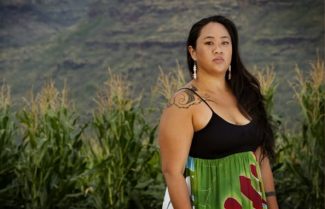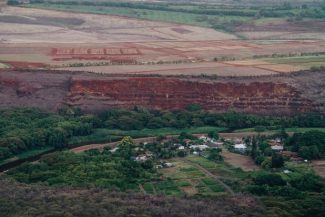Island Earth (Cyrus Sutton, 2017): USA
Reviewed by Rachel Gately. Viewed at Metro 4 at Santa Barbara International Film Festival 2017.
When Malia Chun’s family became mysteriously sick after the sugarcane field across the street from their home was converted to a test site for heavy-pesticide GMO crops, she decided to investigate. She wanted to know why they needed to use so many chemicals to simply grow food. What was really going on?
Cyrus Sutton’s beautifully shot Island Earth chronicles the lives of three Hawaiians who are interested in creating positive change in local agriculture and returning to a natural way of growing food. Malia Chun is a cultural practitioner and educator who is a passionate and charismatic leader in the anti-GMO movement in Kauai. Cliff Kapono, originally from Hilo, is finishing up his PhD in Chemistry at UCSD. Interested in breaking into Hawaiian agriculture, Cliff learns that the GMO business, which is purported to be the magic bullet to end world hunger, may instead lean more toward making a few chemical companies richer. And finally, Dustin Barca decides to run for mayor of Kauai after learning that many of the local politicians have corrupt financial ties with GMO chemical companies and growers.
This is a very important film, not just for Hawaiians but for all of humanity. In it, Sutton take a non-judgmental look into the GMO testing industry in Hawaii. Many of the GMO chemical companies test their products in Hawaii where the weather is conducive to year-round mono-crop growth, depleting the soil of valuable nutrients and microorganisms. The smells are evidence enough and further still are the results of chemical tests showing 60+ chemicals in residents’ bodies. Sutton shares, “As UC Berkeley professor Tyrone Hayes asserts, 90% of the world’s seeds are owned by a handful of the world’s largest chemical companies. In fact, a recent New York Times article shows that the use of herbicides has risen a whopping 21% since the introduction of GMO herbicide resistant seeds twenty years ago.” (islandearthfilm.com) Those chemical companies are not interested in making crops healthier. They are interested in making money. We must stand up against these abusive companies by spreading the word and working together to create positive change.
Sutton does a superb job of showing the complexities of the issue; no easy task in a 64 minute film. Perhaps Malia sums it up the best when she recalls with her children, “If we take care of this land…it will take care of us.”
About this entry
You’re currently reading “Island Earth (Cyrus Sutton, 2017): USA,” an entry on Student Film Reviews
- Published:
- 02.21.17 / 10pm
- Category:
- Films, Santa Barbara Film Festival 2017


3 Comments
Jump to comment form | comments rss [?]